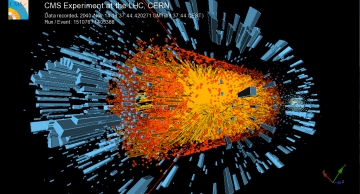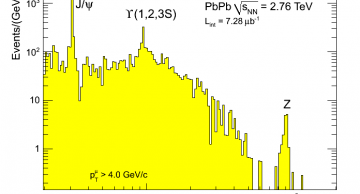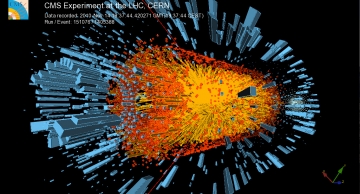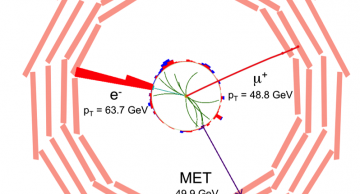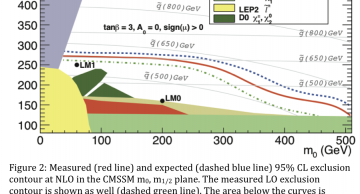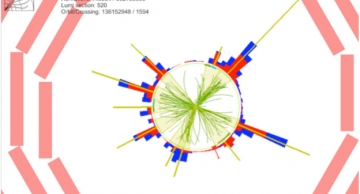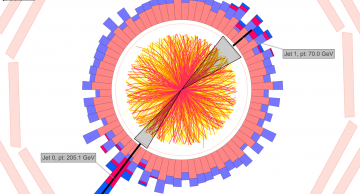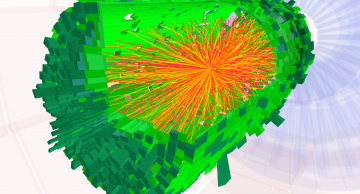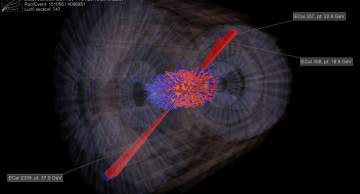Perhaps the most anticipated result of the LHC involves the search for the Higgs boson, the only particle predicted by the Standard Model (SM) that has not yet been seen by experiments. The Higgs boson helps explain how elementary particles acquire…
The Higgs boson is the only particle predicted by the Standard Model that has not yet been seen by experiments. It helps explain how elementary particles acquire mass. If the Higgs boson exists it will be produced in proton-proton collisions at the…
The CMS collaboration is presenting its latest results this week at the 2011 Europhysics Conference on High-Energy Physics, held in Grenoble, France. These results are based on about 1 inverse femtobarn[1] of data (100 trillion proton-proton…
The CMS collaboration is presenting its latest results this week at the annual Quark Matter conference, held this year in Annecy, France. The results are based on analyses of data collected during the LHC's heavy-ion run in the last two weeks of…
The CMS experiment has made several unique measurements using data from LHC collisions of lead nuclei (PbPb, November 2010) at centre-of-mass energies of 2.76 TeV per nucleon pair.
Phenomena measured for the first time in nucleus-nucleus collisions…
In our Universe today, quarks are always bound together by gluons to form "composite" particles such as protons and neutrons. The Quark-Gluon Plasma, or QGP, often described as a soup-like medium, is a hot, dense state in which these quarks and…
The CMS Collaboration at CERN released a paper today entitled "First Measurement of W+W− Production and Search for Higgs Boson in pp Collisions at √s = 7 TeV". The paper is the first produced by CMS that includes searches for the Higgs boson at the…
The Compact Muon Solenoid (CMS) Collaboration at CERN’s Large Hadron Collider (LHC) has announced the results of the search for supersymmetry (SUSY) in events with jets and missing transverse energy. The search is based on data accumulated by the…
The CMS experiment at CERN's Large Hadron Collider (LHC) has completed a search for microscopic black holes produced in high-energy proton-proton collisions. No evidence for their production was found and their production has been excluded up to a…
After only three weeks of heavy-ion running at CERN’s Large Hadron Collider (LHC), the CMS experiment is already yielding new insights into the condition of matter that existed in the very first instants of the Universe’s life, some 13.7 billion…
The CMS experiment at CERN's Large Hadron Collider (LHC) has recorded its first Lead-Lead collisions at a centre-of-mass energy of 2.76 TeV per nucleon pair, marking the start of its heavy ion research programme. Physicists around the world expect a…
Z bosons produced in collisions of heavy ions have been observed for the first time by the CMS experiment at CERN’s Large Hadron Collider (LHC). CMS observed 10 events containing a distinctive candidate Z boson reconstructed from a pair of electrons…
Pagination
- Previous page
- Current page 1
- Page 2
- Next page

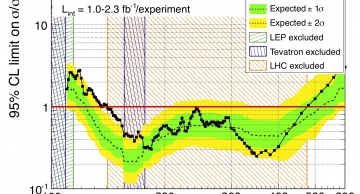
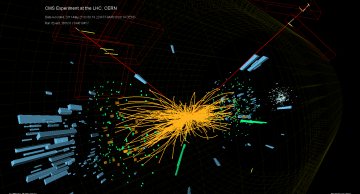
![Fig 1. Event display of a ZZ event. One Z decays to two electrons (red towers) [...]](/sites/default/files/styles/grid3_360x195_/public/field/image/Fig1-CMS-2e-2mu-evt-394010457-3D.jpg?itok=mN2SzUbF)
